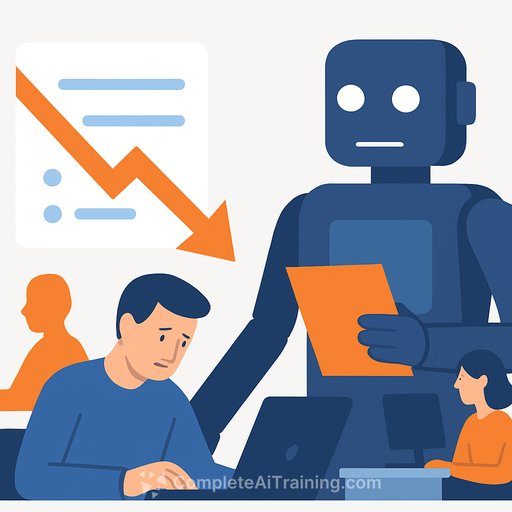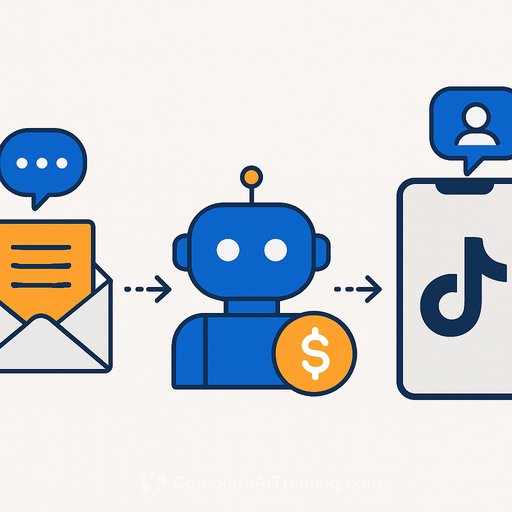AI is shrinking legacy support roles. Here's how to stay valuable.
New research from BearingPoint signals a hard shift: many companies are reporting 10-19 percent workforce overcapacity as AI gets rolled out. Roles built on routine analysis, transactional support, and repetitive knowledge work are first in line.
IT, administration, and customer support are already under the microscope. By 2028, nearly half of companies expect 30-50 percent excess capacity if they don't redesign work around human-AI collaboration.
What this means for customer support
- High-volume, repetitive tickets (password resets, order status, basic policy questions) will be automated.
- "Button-clicking" and pure process execution won't be a moat anymore.
- The value shifts to exception handling, complex troubleshooting, customer trust, and improving systems so fewer tickets happen in the first place.
The signal behind the noise
Executives are rethinking job architecture, not just tools. The focus moves from "agent does everything" to "agent designs, supervises, and improves the workflow while AI handles repeatable steps."
Some companies are already trimming back-office headcount as AI scales. Others say overall headcount won't drop immediately, but hiring will slow and roles will change. A Yale study also notes limited proof of job losses so far in the US, but the direction of travel is clear: productivity up, demand for legacy tasks down.
90-day action plan (for frontline agents and team leads)
- Days 0-30: List your top 20 ticket types and tag each as automate, assist, or human-only. Capture baseline metrics: volume, AHT, FCR, CSAT, escalations. Pilot an AI assistant for summaries, sentiment, and response drafts on 1-2 ticket types.
- Days 31-60: Turn your best responses into reusable prompts and templates. Clean up knowledge articles (clear steps, screenshots, edge cases). Route low-risk tickets to AI first response with human review.
- Days 61-90: Redesign roles: shift agents into "workflow owners" responsible for one part of the funnel (deflection, assist, escalation). Track AI deflection rate, accuracy, override rate, and customer effort. Create QA rules for when humans must step in.
Skills that make you indispensable
- Prompt design for support scenarios (tone, policy injection, fallback rules).
- Knowledge management and data hygiene: structure, tagging, and versioning.
- Process design: triage logic, routing, and clear escalation paths.
- Analytics: measure containment, cost per resolution, and sentiment shifts.
- Quality and risk: guardrails for refunds, compliance, and sensitive data.
- Human skills: de-escalation, high-empathy cases, complex troubleshooting.
Need a curated path to upskill? Explore role-focused options on Complete AI Training by job or sharpen your prompt skills with prompt engineering resources.
Redesign your support workflow (simple blueprint)
- Deflect: Update help center articles and power them with AI search. Keep answers short, trusted, and actionable.
- Triage: Auto-tag by intent, urgency, risk, and customer tier. Send sensitive topics straight to humans.
- Assist: Let AI draft replies with citations from your knowledge base; agents approve and personalize.
- Escalate: Clear criteria for human-only scenarios (billing disputes, legal, VIP churn risk).
- Improve: Weekly review of AI errors, article gaps, and macro drift. Close the loop with product and ops.
Metrics to run (and keep your seat at the table)
- AI deflection rate vs. CSAT impact.
- Accuracy and override rate on AI drafts.
- Time to resolution by intent, not just channel.
- Percent of tickets prevented via product or content fixes.
- Compliance flags and error severity (track near-misses, too).
Career paths opening up in support
- Support Operations and Automation Lead.
- Knowledge Engineer / Taxonomy Owner.
- Conversational Designer for chat and email flows.
- QA and Policy Reviewer for AI-assisted replies.
- Customer Insights Analyst (turn ticket data into product fixes).
Leadership checklist
- Map roles to future skills; offer re-skilling before hiring freezes bite.
- Stand up an AI QA function with audit trails and clear escalation rules.
- Tie incentives to prevention (fewer tickets) and quality, not just speed.
- Partner with Legal and Security on data retention and prompt safety.
- Publish a simple "what AI can and cannot do here" policy for staff.
Bottom line
Legacy support tasks will shrink. The people who design workflows, improve knowledge, and handle high-stakes moments will rise.
Don't wait for a reorg. Build the skills, run the pilots, show the metrics. That's how you make AI work for you, not against you.
Your membership also unlocks:





